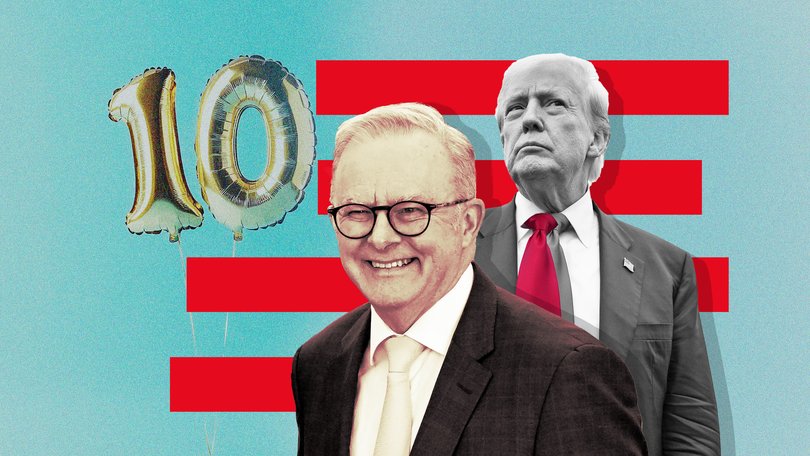EDITORIAL: Tariff reprieve won, but how did it happen?
EDITORIAL: While the Albanese Government has earned the right to relish this victory, there are signs this trade turmoil isn’t over yet.

How on earth did we manage to skate out of that one?
Somehow, Australia has managed to escape a tariff on exports to the US any higher than 10 per cent already introduced.
Meanwhile our neighbours in the region, including New Zealand, Fiji, Vanuatu and Papua New Guinea have all been hit with 15 per cent levies on goods sent to the US.
Sign up to The Nightly's newsletters.
Get the first look at the digital newspaper, curated daily stories and breaking headlines delivered to your inbox.
By continuing you agree to our Terms and Privacy Policy.Syria received the highest tariff at 41 per cent, while Laos and Myanmar both copped 40 per cent.
It is a good result for Australia, and one for which the Labor Government deserves credit.
It’s all the more remarkable considering our passive approach to lobbying the Americans in recent months.
Tariffs are now Donald Trump’s preferred weapon, regardless of the arena.
Anthony Albanese is yet to meet in person with US President Donald Trump and the pair’s last phone conversation followed the Prime Minister’s re-election in May.
Compare the PM’s hands-off approach to that of his UK counterpart Sir Keir Starmer.
Sir Keir was one of the first world leaders to lock in a special deal with Mr Trump, giving the Brits a blanket tariff rate of 10 per cent.
That has been heralded as wise, given exports from the European Union are now subject to a baseline levy of 15 per cent.
To get the deal over the line, the UK agreed to lower its tariffs to 1.8 per cent from 5.1 per cent and provide greater market access to US goods and remove tariffs on US ethanol. British Airways also agreed to place a US$10 billion order for 32 new Boeing planes — ostensibly a commercial agreement, but one which had been spruiked by US Commerce Secretary Howard Lutnick as part of the deal.
The Brits were also unabashed in using their other assets to their advantage, targeting Mr Trump with an avalanche of flattery; letters from King Charles, invitations for state visits and a stream of chummy phone calls and WhatsApp messages from Sir Keir.
On the face of it, we have done far less yet managed to get the same result.
Certainly, we’ve been told our diplomats had been throwing everything at the problem, but there was scant detail as to what that everything entailed.
Is this a victory of Ambassador Kevin Rudd’s charm? Or do we owe it more to the work of professional golfers turned amateur diplomats Greg Norman and Adam Scott?
What impact did the decision to overturn a longstanding de facto ban on American beef entering Australia have? The Government swears the move was entirely unrelated to trade negotiations, despite the fact the biosecurity restrictions had been singled out by Mr Trump as a source of irritation.
Trade Minister Don Farrell says there’s no mystery: the result was simply a “vindication” of the Albanese Government’s “cool and calm” diplomacy.
And while the Government has earnt the right to relish this victory, there are signs this trade turmoil isn’t over yet.
Mr Trump’s threat this week to levy Canadian imports at an even higher level as punishment for the nation’s support for Palestinian statehood is a sign that tariffs are now Mr Trump’s preferred weapon, regardless of the arena.
